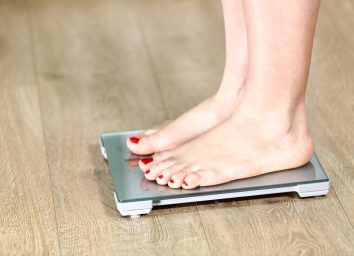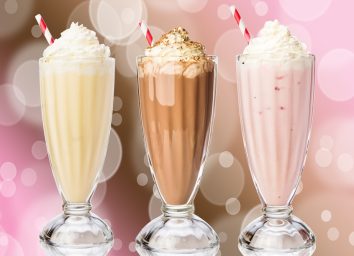40 Habits That Make You Sick and Fat
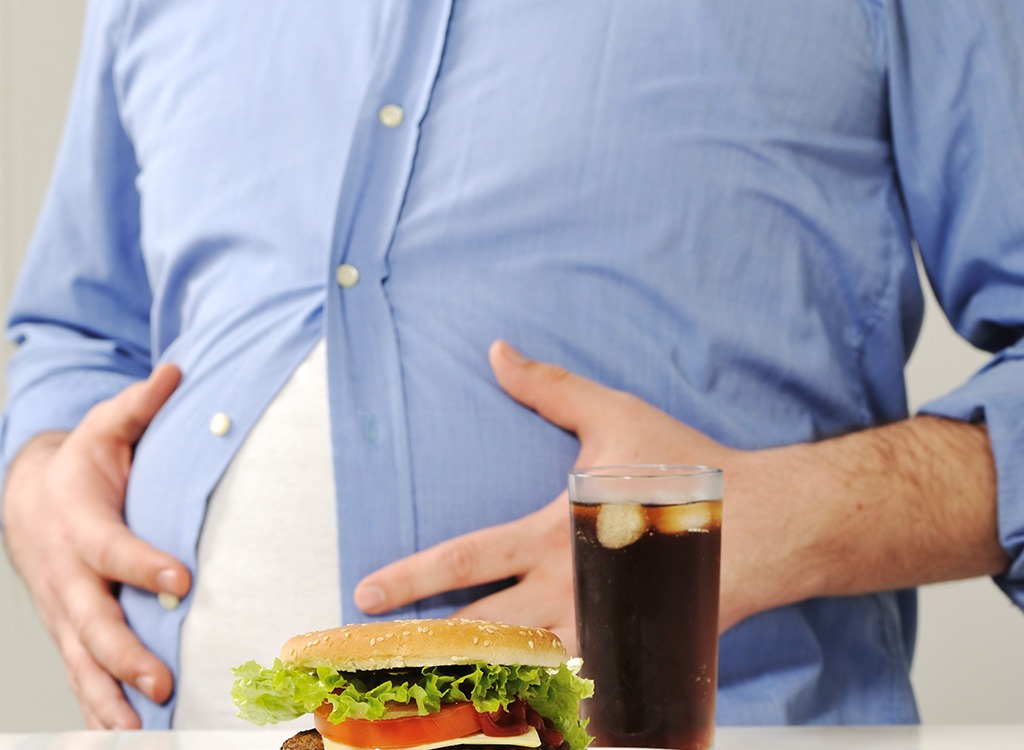
You look and feel great! But even though you’re fit and healthy right now, that doesn’t necessarily mean your daily so-called “good” habits will help you maintain your well-being into the future. Read on to learn about the mistakes you may be making, and how you can avoid them. Your future self is sure to thank you!
You Drink Out of a Plastic Bottle
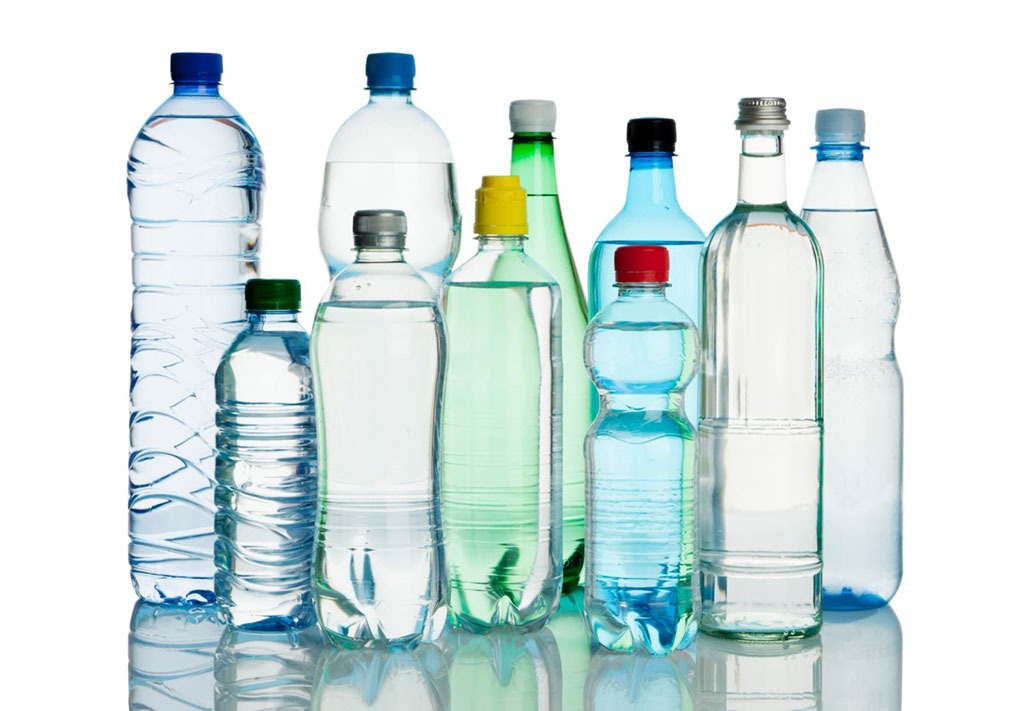
You know how important it is to stay hydrated, which is why you’re never seen without a bottle of Poland Spring by your side. While we commend you for getting your daily dose of H20, you should seriously consider trading your throw-away bottle for the reusable, BPA-free variety. Bisphenol A, commonly referred to as BPA, can negatively impact fertility in both men and women and has also been been linked to obesity. Don’t believe it? The science doesn’t lie: A 2011 Harvard study found that adults with the highest concentration of BPA in their urine had significantly larger waists and chance of being obese than those in the lowest quartile.
You Don’t Drink This Tea

Green tea blasts flab. Researchers attribute the fat-burning properties of green tea to catechins, specifically EGCG — the name of a group of antioxidative compounds that fry adipose tissue by revving the metabolism, increasing the release of flab from fat cells (particularly in the belly), then speeding up the liver’s fat-burning capacity. Green tea is so powerful for weight loss that we made it the centerpiece of our new 7-Day Flat-Belly Tea Cleanse! Test panelists lost 4 inches from their waists!
You Don’t Go to Sleep Early Enough
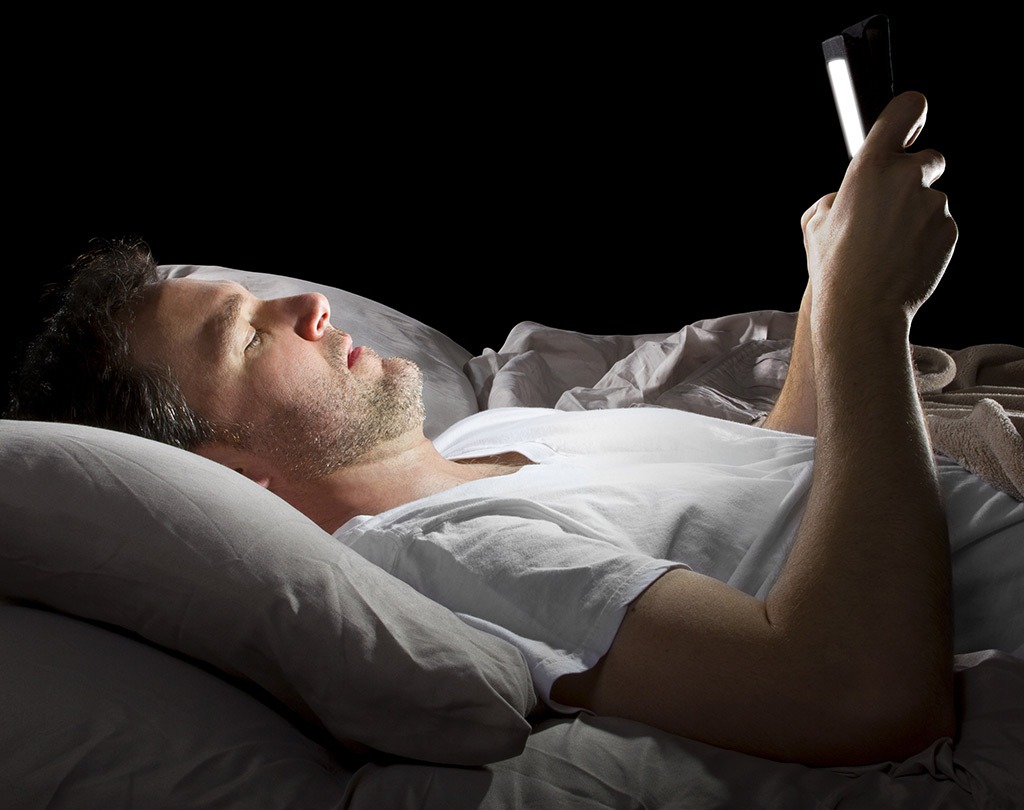
According to the National Sleep Foundation, most of us don’t get enough shuteye. Over time, this can lead to weight gain, anxiety, depression and insulin resistance—which can trigger type 2 diabetes, high blood pressure and heart disease. A good night’s rest fuels the production of fat-burning hormones, so logging a solid seven or eight hours of sleep each evening should be a priority. Check out these 20 Surprising Ways to Lose Weight in Your Sleep!
You Don’t Moderate Your New Diet
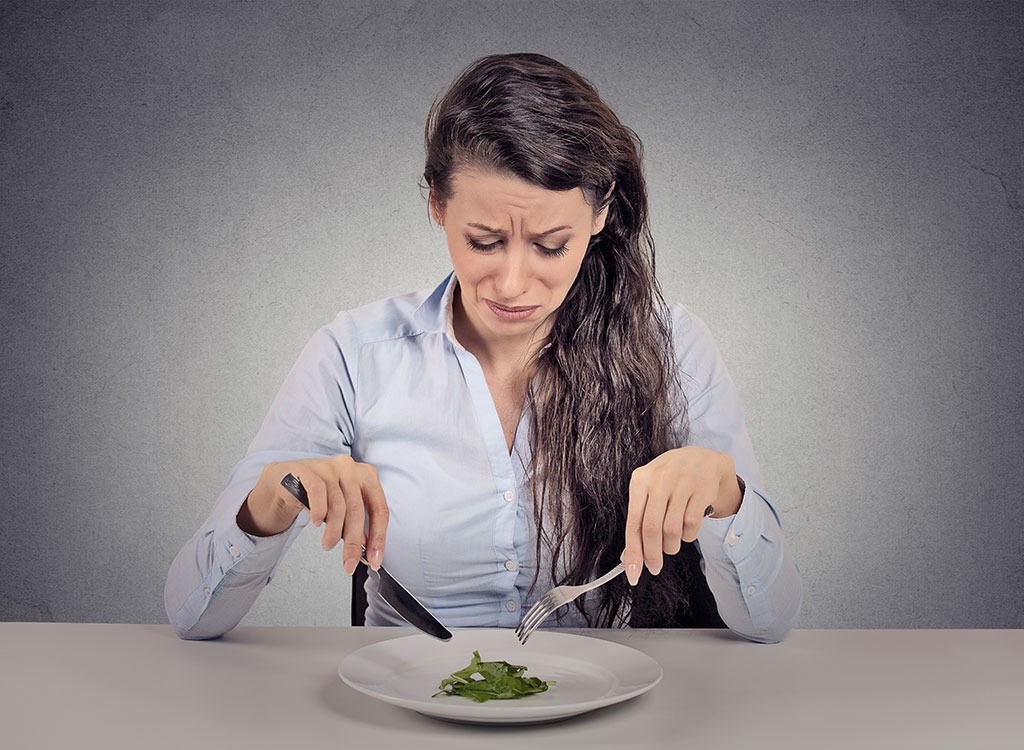
If you’ve just hopped on the paleo or low-carb bandwagon, proceed with caution. “Often diets that cut out entire food groups do not allow for the balance and moderation we need to follow a healthy, lifelong eating plan,” warns Zanini. “Plus, dieters who follow these plans may be prone to potentially dangerous nutritional deficiencies. Or they may simply get bored with their restricted plan and end up overeating down the road.”
Your Home-cooked Portions Are Too Big
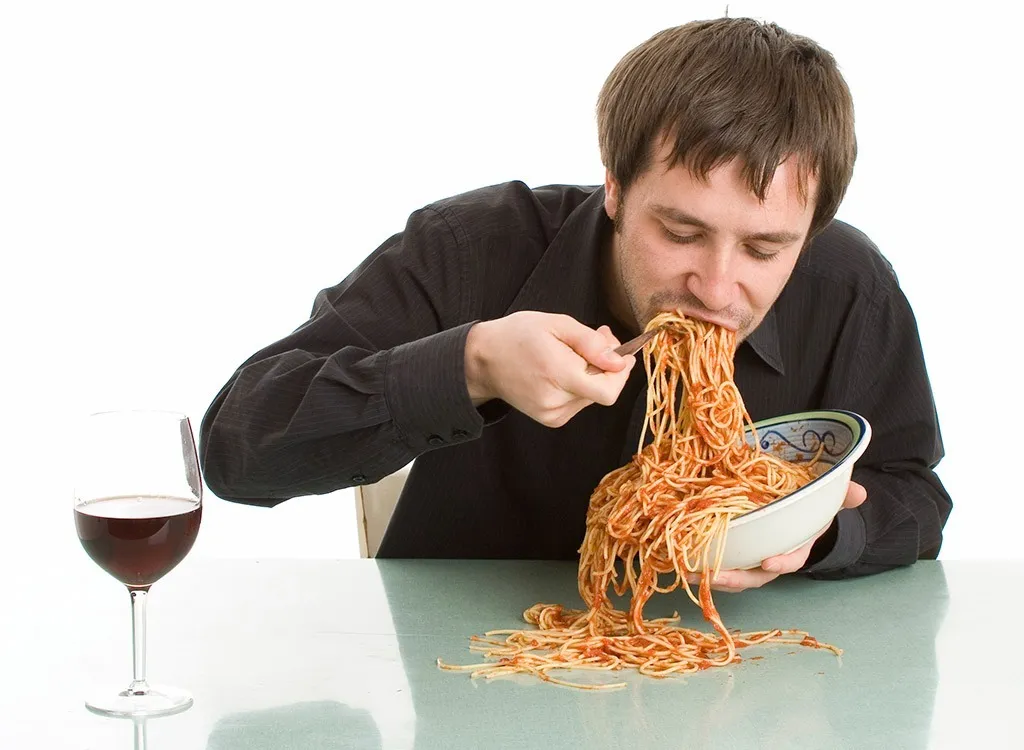
Just because your meal is healthy doesn’t mean you don’t have to practice portion control. Remember, even virtuous foods have calories! Half of your plate should be filled with veggies and the remaining half should hold a cellphone-sized serving of lean protein, a fist-sized serving of grains and a bit of fat no larger than the size of your pointer finger.
You Don’t Get Tested for Nutritional Deficiencies

Although you may get scanned for high cholesterol or diabetes at your annual exam, M.D.s don’t typically test or look for physical signs of nutritional deficiencies—which can be dangerous! Michelle Loy, MPH, MS, CSSD, Registered Dietitian Nutritionist and owner of Go Wellness in Orange County, California suggests having your vitamin D levels checked if nothing else. “Many people are deficient and don’t even know it—and not getting enough may increase the risk of osteoporosis, heart disease and certain types of cancer,” she warns.
You Shun Healthy Fats

You know that eating trans fats can increase your risk of heart disease, weight gain and stroke, so you’re smart to stay away. But not all fats need to make your “do not eat” list. Consuming healthy fats like flax seeds and nuts can actually help you slim down and stay healthy. “Fats not only help us absorb many of the vitamins from our diets, but they also help keep us fuller longer, which can aid weight loss efforts,” explains Zanini. She suggests consuming one serving of healthy fats each time you sit down to eat. This could be 1/4 cup of almonds or walnuts, some sautéed veggies cooked with a tablespoon of olive oil or a few slices of avocado.Stock your kitchen with these 20 Best Full-Fat Foods for Weight Loss!
You Don’t Ask How Restaurant Food is Cooked

Chefs often add fat and salt to make meals taste better—but these ingredients aren’t necessarily something they advertise on the menu. Since you’ve already taken such care to choose a meal that sounds healthy, take the extra step and ask your server if there is any cream or butter in your dish. If these is, ask for your veggies and meats to be cooked dry and have sauces come on the side so you control how much ends up on your plate. After crunching the numbers, we discovered that no matter what kind of restaurant you’re dining at, you can save up to 1,000 calories at each meal by making this simple request!
You Ignore Sodium
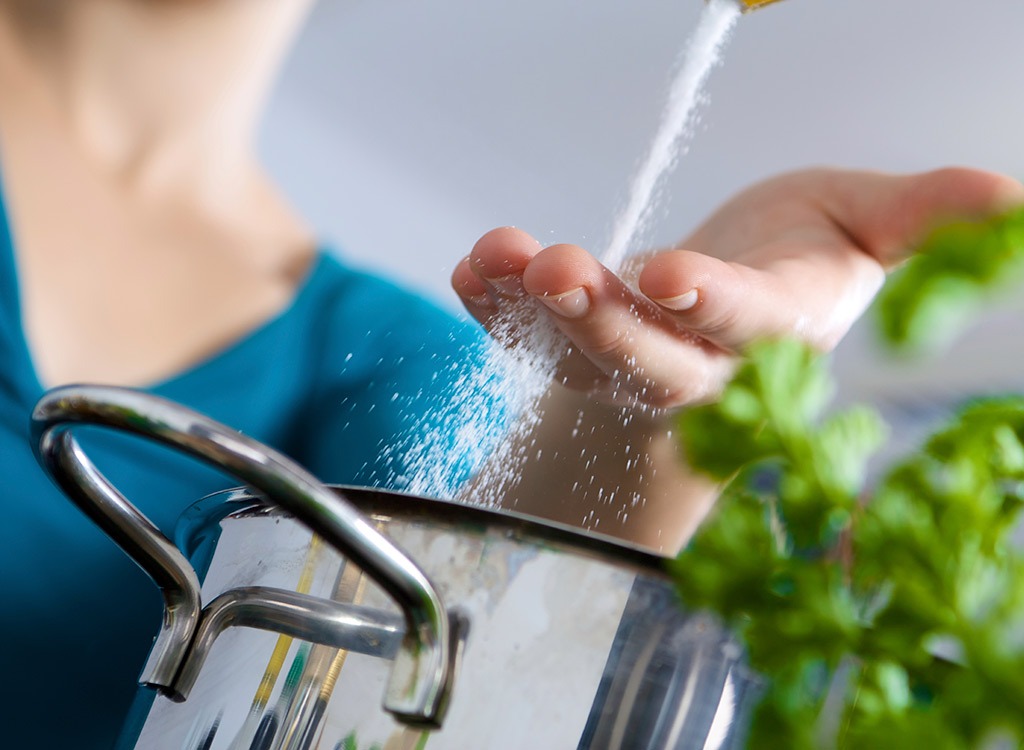
Your favorite trail mix only has 150-calories, but did you check to see how much sodium is lurking inside the package? All too often, those who aren’t suffering from a health condition overlook that part of the nutrition label. “Americans consume, on average, about 50 percent more than the daily recommended intake of salt, and most of the excess sodium is coming from processed foods like frozen waffles, bagels, cheese cottage cheese, veggie burgers and salad dressings,” says Loy. Sticking to The Institute of Medicine’s daily recommendation of 2,300 milligrams per day or less can help you keep a bloated belly, high blood pressure and other health conditions at bay.
You Can’t Give Up Soda
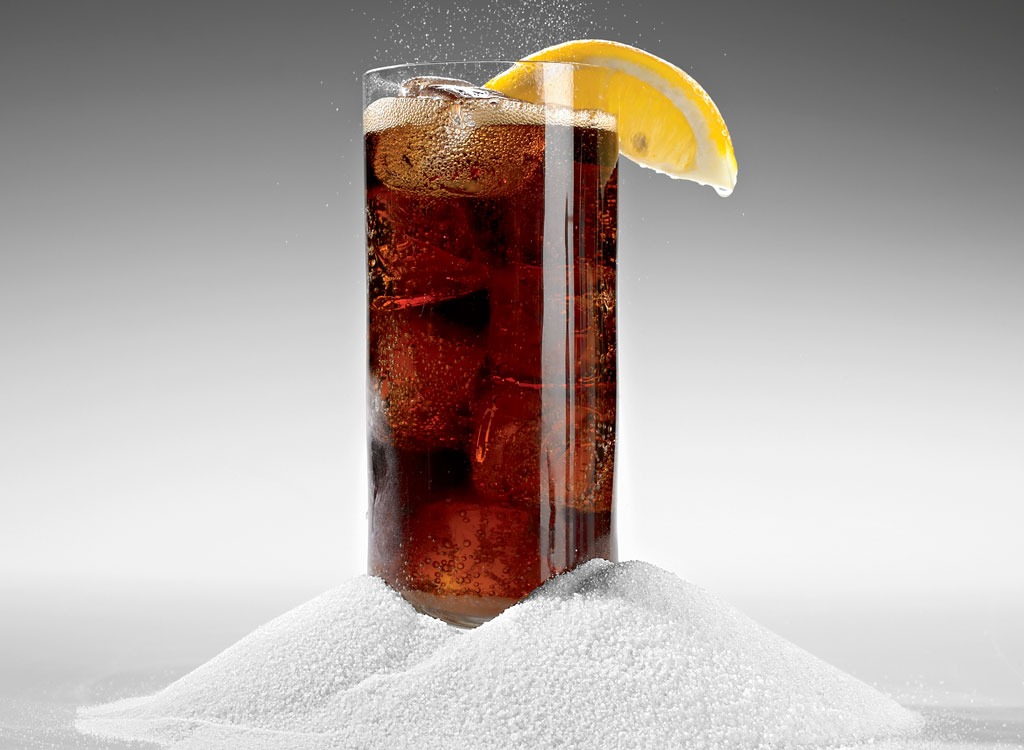
What do synthetic estrogen, flame retardants and rocket fuel all have in common? As we learned in Zero Belly Diet, they can all be found in a can of your favorite diet soda. BPA, the synthetic estrogen, is used to soften the plastic that lines the can; colas contain caramel coloring shown to cause cancer in humans; and citrus-flavored sodas contain BVO, a flame retardant used in rocket fuel that may reduce fertility and negatively affect thyroid hormones. Nearly all popular diet sodas contain aspartame, an artificial sweetener that raises glucose levels, overloading the liver and causing the excess to convert into fat. See What Happens to Your Body When You Give Up Soda!
You Always Buy Low-fat Treats
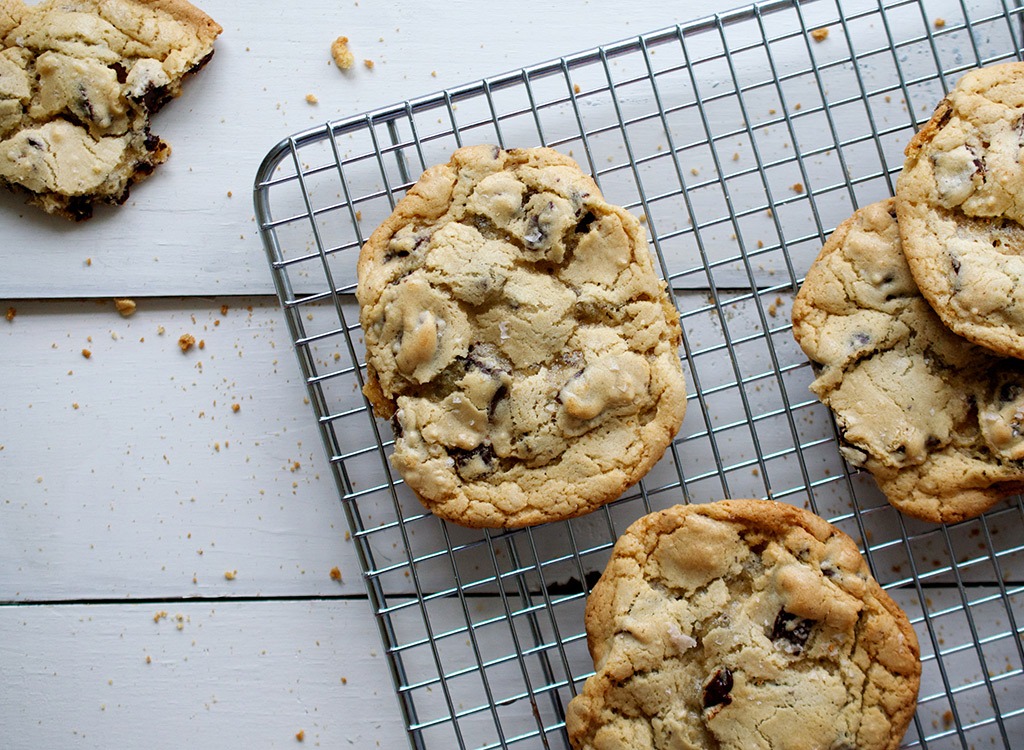
If every time you have a cookie craving you buy a low-fat package, you may be doing your body a disservice. Not only are diet foods typically filled with enough sugar to derail even the most disciplined dieter, but these faux sweet treats are also made with additives that can make you feel unsatisfied. In turn, you’ll likely consume far more calories than you intended. To stay trim, eat the real thing, but downsize your portion. If you love ice cream, for example, skip the fro-yo and have a small scoop of premium.
You Don’t Eat Organic
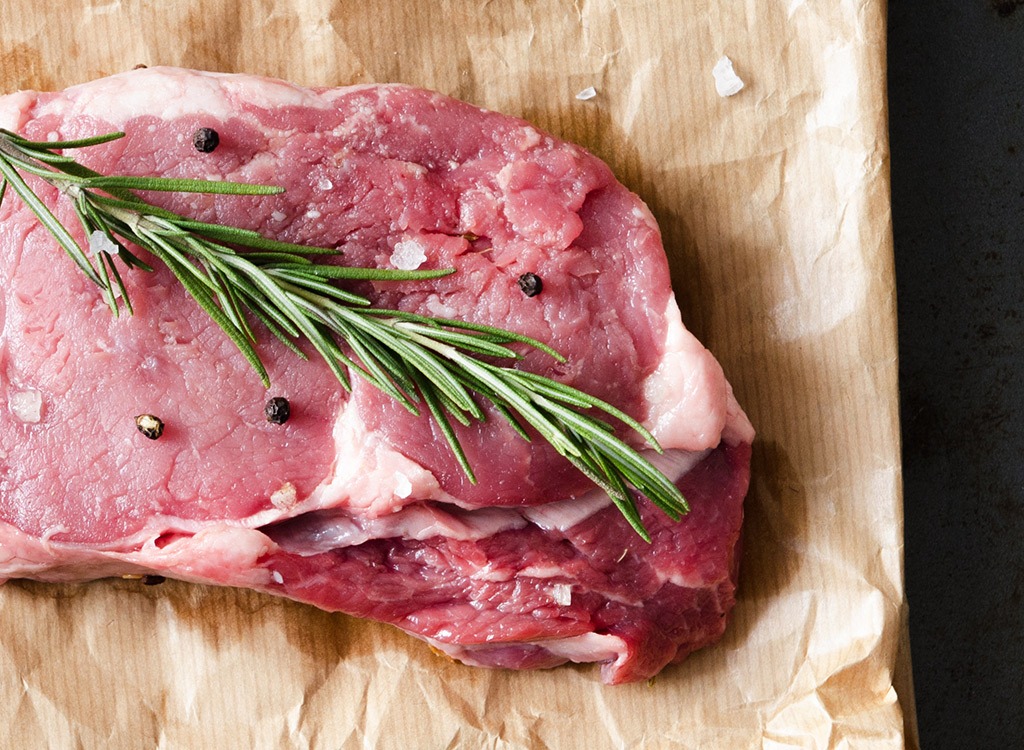
Throughout your life, you accumulate toxins from food and drink, which can lead to obesity. Many of those come from pesticides and hormones in produce and meat. Choose organic fruits and vegetables and hormone-free meat. Speaking of meat, you can lose weight eating at McDonald’s, if you use this list of Every Menu Item at McDonald’s—Ranked!.
You Eat Too Fast

We get it — we’re all busy and often have to eat fast and on the fly. But that often gets in the way of losing weight, because we’re not giving our stomachs time to register that we’re full. Here’s a trick: Divide your plate in two. Eat half, and do something else for 30 minutes. It’ll still be there when you get back, but your hunger may have left the building. Also, fill up cheaply and easily with any of these 20 Best-Ever Fat Burning Soups.
You Don’t Keep Healthy Snacks Around
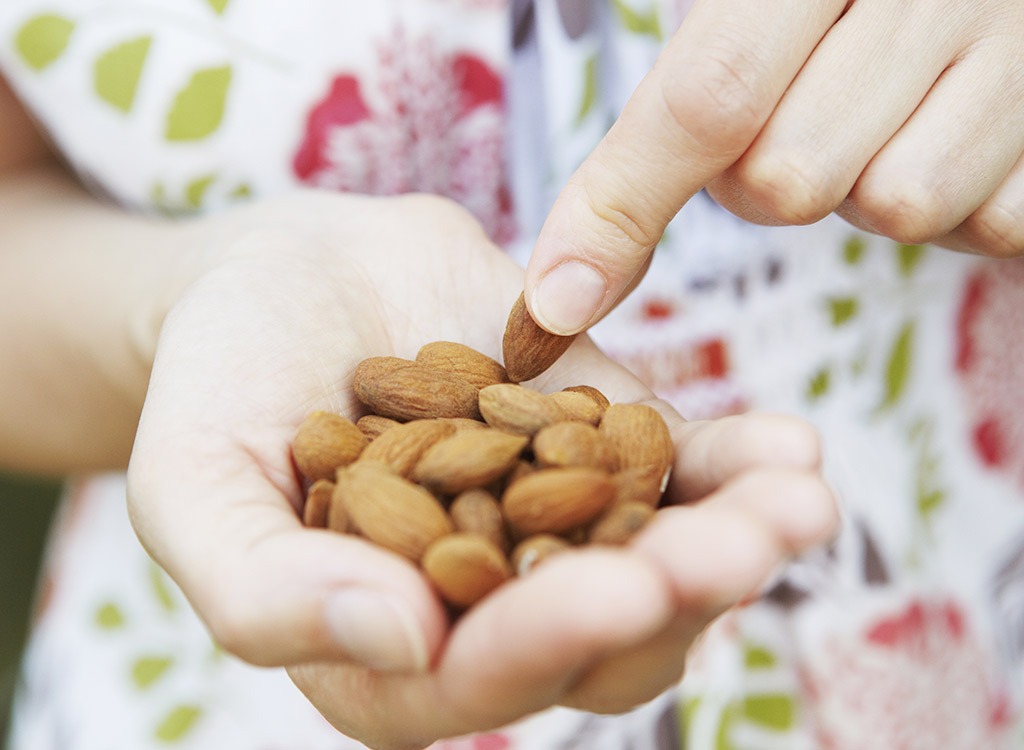
“Always be prepared for a busy or unpredictable day by keeping healthy snacks on you, at your desk, in your car,” says nutritionist Amy Shapiro. She suggests having almonds or other unsalted nuts, apples, bananas, chia bars, protein bars, or other fruit and nut bars close at hand. Shapiro says that if you have to skip breakfast, lunch, or even dinner during your quest to look your best, you can keep your energy levels up while making healthy choices. “You’ll have no reason to run to the vending machine for chips or stick your hand in the candy bowl,” she says. Need some ideas? Stock up on some of these 50 Best Healthy Snacks for Weight Loss!
You Go Straight for the Couch

After a long day at work, it’s tempting to flop on your cozy couch and not move until it’s bedtime. But, even if you’re reading or online shopping while your significant other watches their favorite shows, it still mimics that sedentary post-work lifestyle. A recent analysis of studies found that for every two hours spent watching TV, the risk of developing diabetes or heart disease increased by 20, 15 and 13 percent, respectively. Scientists are still figuring out exactly why sitting is so detrimental to health, but one obvious and partial explanation is that the less we move, the less fuel we require; the surplus blood sugar floods the bloodstream and contributes to diabetes and other weight-related risks.
You Don’t Eat Enough Protein
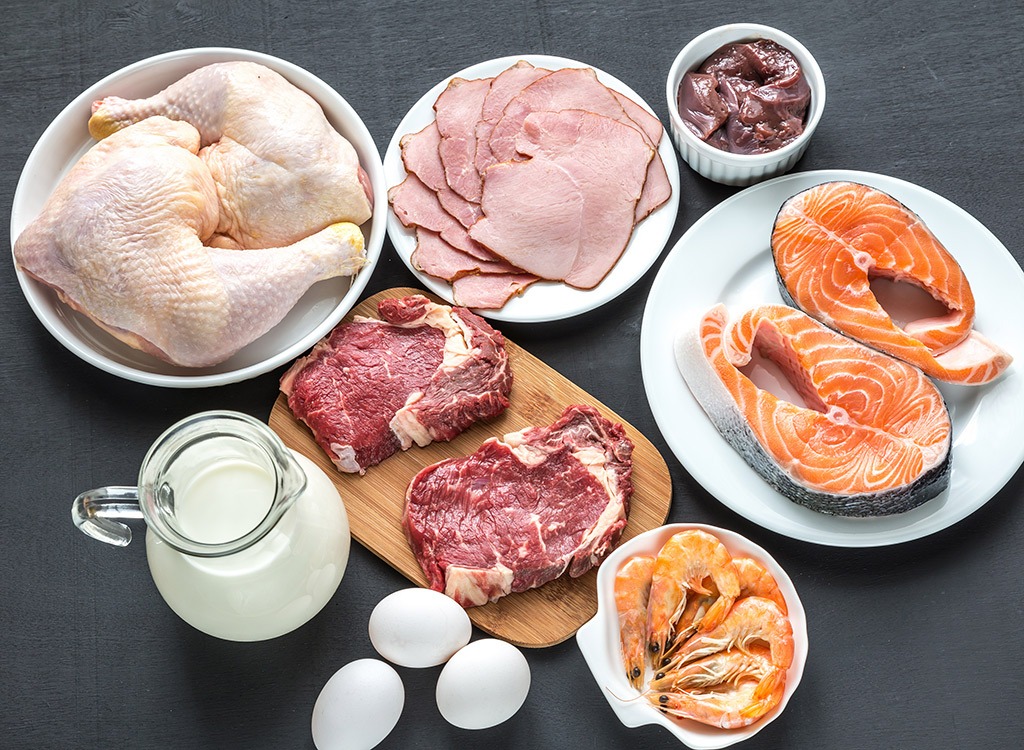
Consuming enough protein is important for two reasons: Protein is satiating, which staves off overeating; and protein maintains muscle. The more muscle you have, the more fat you burn, even at rest. Much of retaining muscle mass is dependent on exercise. Part is down to protein intake. Eat more lean meats, fish and Greek yogurt, and you’ll keep your fat-burning engines revved. And stock your kitchen with these 30 Best-Ever Proteins for Every Goal!
You Skip Weights at the Gym
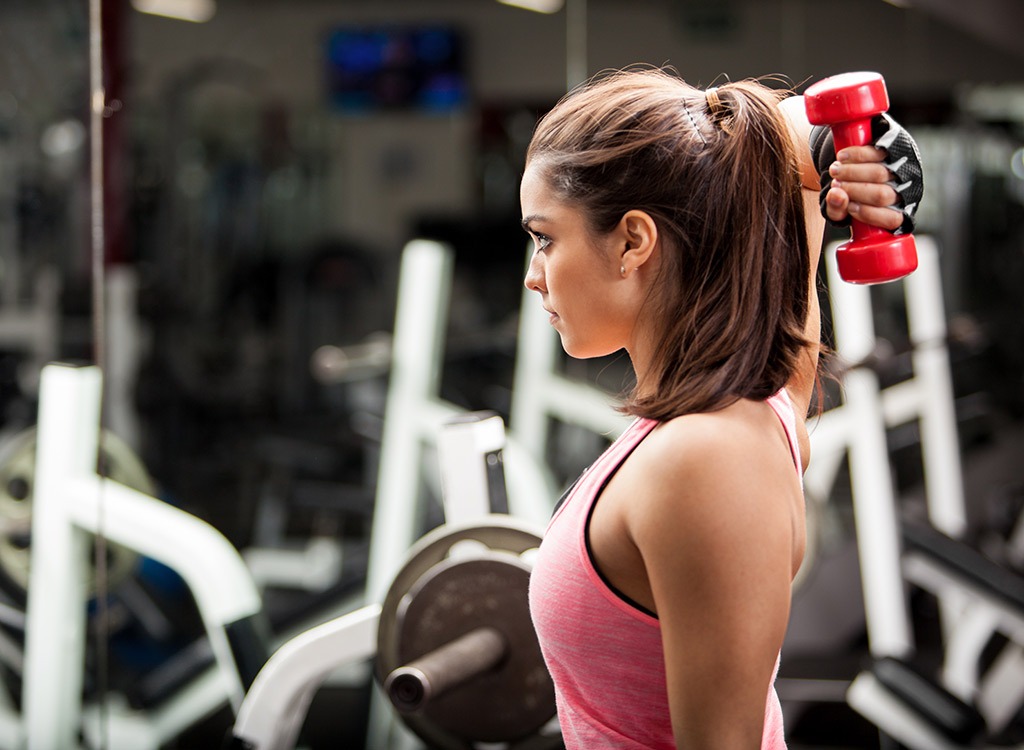
Muscles are what keeps our metabolism high and as we age, our muscles slowly start to get smaller, therefore allowing our metabolism to slow down. To counteract this, Shapiro recommends that we start lifting weights. “No, you won’t get big and bulky. In fact, you’ll stay lean,” she says. That’s because weight training causes you to burn more calories per workout than cardio sessions, and you continue to burn them post workout. And that’s not all—click here to discover 40 Ways to Lose 4 Inches of Body Fat!
You Don’t Watch Empty Calories at Restaurants
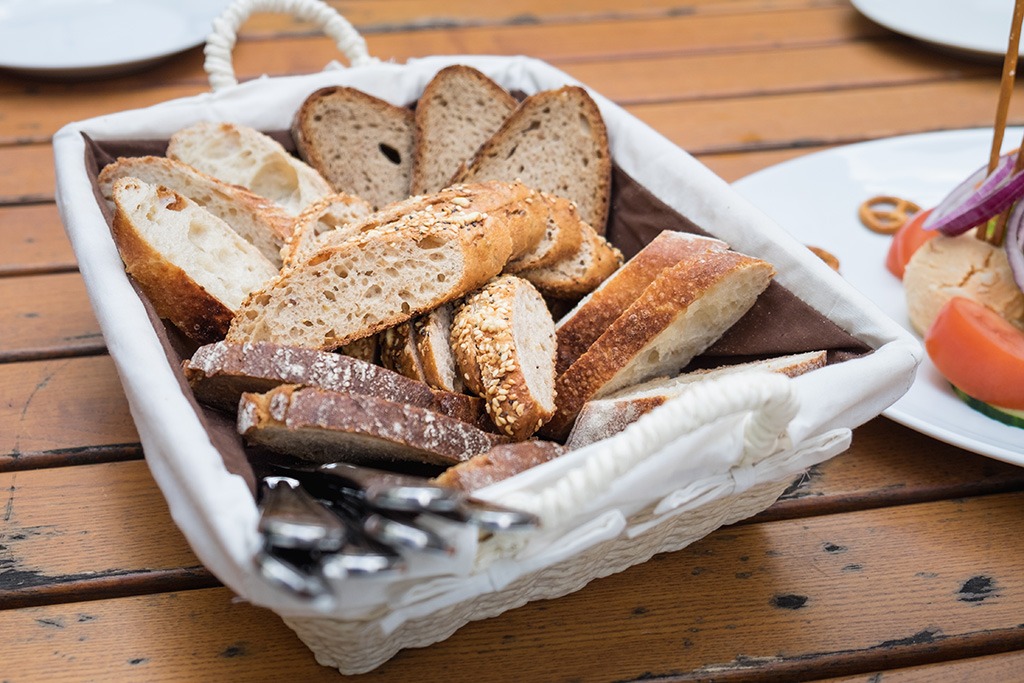
Going out to eat is a minefield of wasteful carbs: The bread basket, free tortilla chips, two-for-one cocktails… You can indulge, but be strategic about it. “I always recommend picking your poison,” says Shapiro. “Bread or carbs, alcohol or dessert – choose one, not all three.” All of these pack empty calories, so by only having one of the three, you limit your total intake.
You Always Clean Your Plate
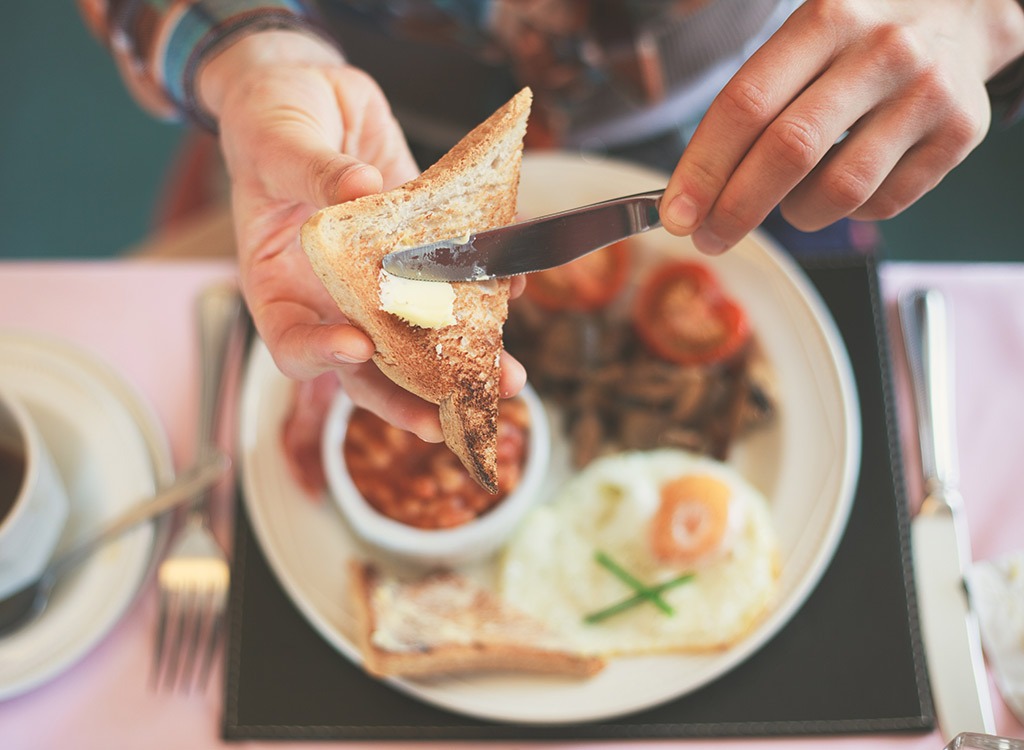
And you don’t necessarily need to. Eat until you’re 80% full, then stop. In Japan, this method is called hara hachi bun me, which roughly translates to “eat until you are eight parts (out of ten) full. Remember, you can always eat a high-protein snack later. Make it one of these 25 Best High-Protein Snacks in America!
You Eat Farmed Salmon
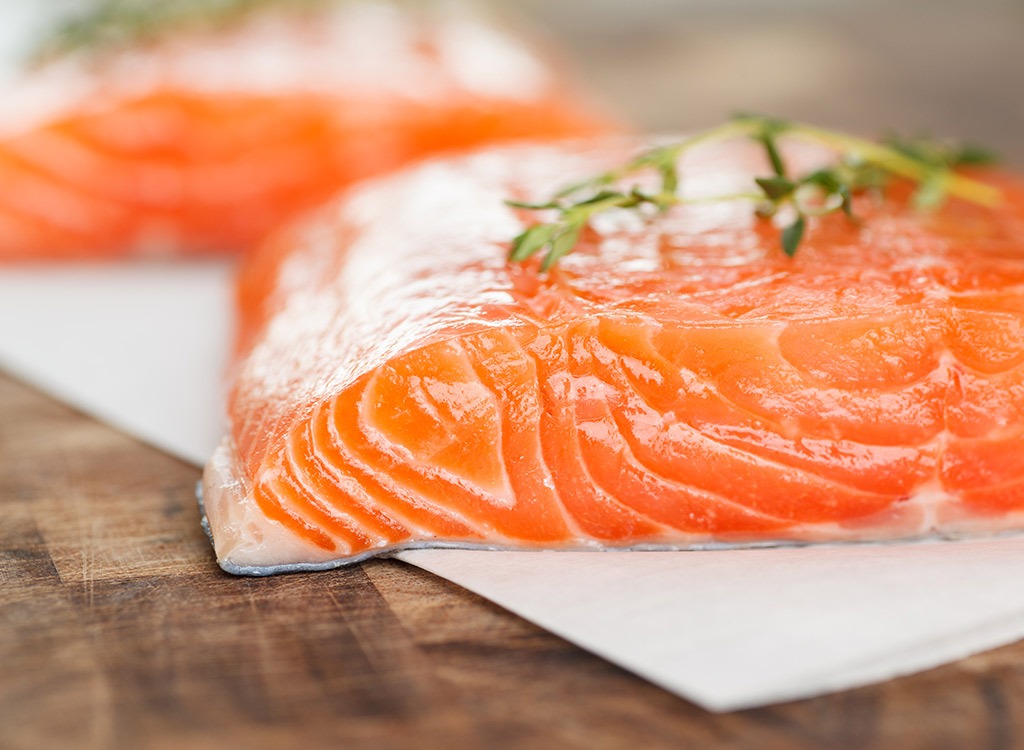
Although wild salmon is high in omega-3 acids, which fight inflammation throughout the body, farm-raised salmon (all Atlantic salmon is farm-raised) is packed with omega-6s, which actually increase it. Because salmon farmers feed their fish soy, wild salmon has just 114 mg of omega-6s while farmed salmon has around 1,900 mg. Not to mention that farmed salmon are usually dyed pink, and have been found to be high in PCBs and have one-fourth the belly-flattening vitamin D of their wild cousins.
You Don’t Relax After Work
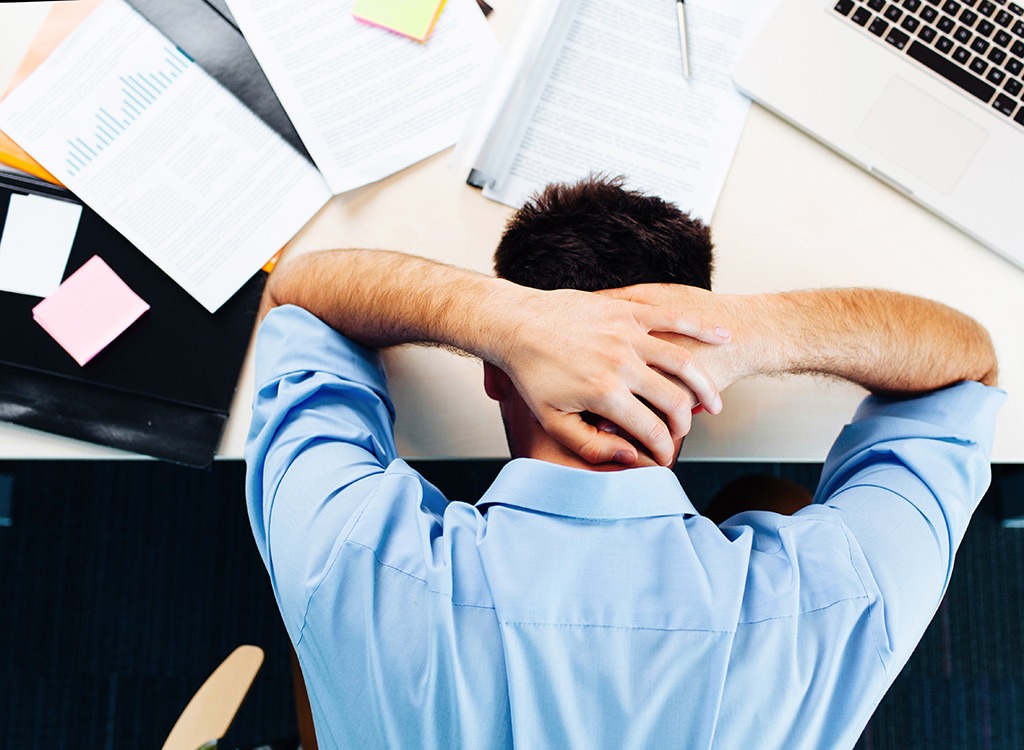
You manage to avoid the office candy bowl, which is pretty impressive, but you’ve got to let off some steam somehow. If you don’t, it could lead to chronically elevated cortisol levels, causing sleep and immunity problems, blood-sugar abnormalities and weight gain. Lori Zanini, RD, CDE, Spokesperson for the Academy of Nutrition and Dietetics says stress relief is very individualized. Give a few different tactics a try and see what works best for you. Practicing yoga, meeting up with friends and unplugging from technology for an evening are all worth a shot.
You Don’t Eat Regularly

An irregular eating schedule can undercut your metabolism. Research from John Moores University in Liverpool found that women who fluctuated between eating low- and high-calorie meals were less happy with their bodies than those whose plates contained a similar number of calories from meal to meal. But it’s not just fluctuating meal size that can derail your weight-loss goals. A Hebrew University study from 2012 found that mice that were fed high-fat foods sporadically gained more weight than mice that ate a similar diet on a regular schedule. Your move? Figure out how many calories you need to achieve your desired weight, and evenly divide that number by the three, four or five meals and snacks you eat per day. Aim for each of your meals to be roughly that size and eat them at about the same time each day. For more metabolism-boosting tips, check out these 55 Best Ways to Boost Your Metabolism!
Your Diet is Too Strict
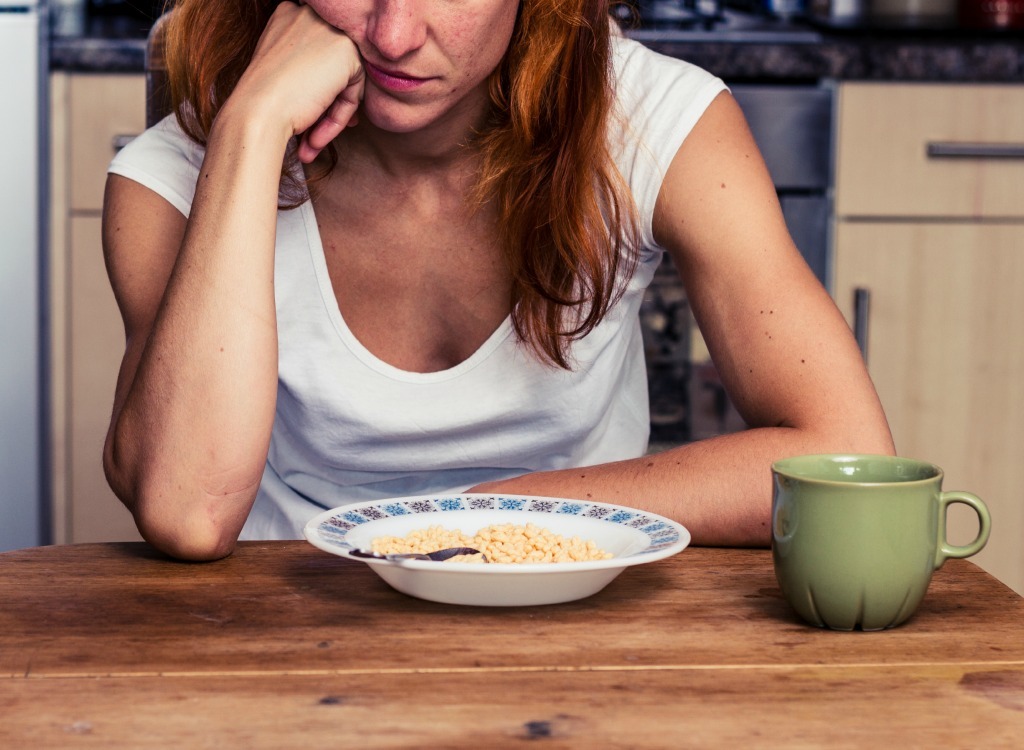
That’s a recipe for disaster. “When my clients feel like they aren’t able to enjoy something indulgent from time to time, it often leaves them with hard-to-ignore cravings,” says Leah Kaufman, MS, RD, CDN, a New York City-based registered dietitian. “I allow my patients to eat 100 discretionary calories each day, so they can satisfy their cravings without falling off track.” Nine Peanut M&Ms and a single Reese’s Peanut Butter Cup both come in right around 100 calories. Try some of these 50 Best Healthy Snacks for Weight Loss!
You Keep Temptation in Your Kitchen
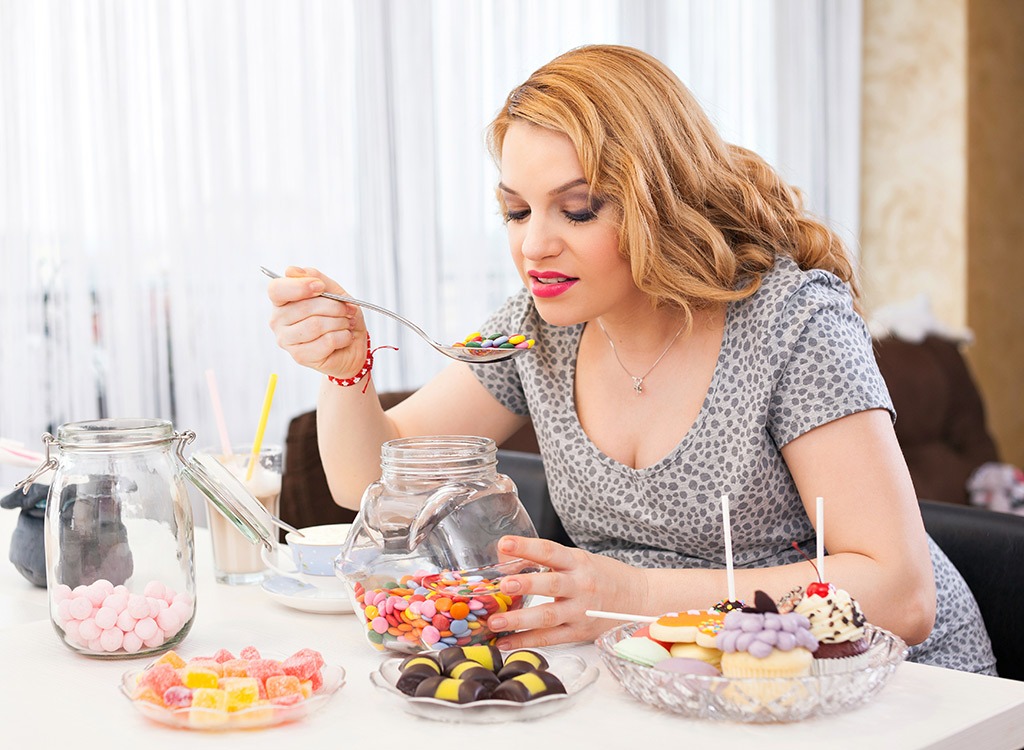
“Whether it’s ice cream, cookies, candy, chips or other items, just knowing that your trigger foods are in the kitchen or office desk can derail any healthy eating program,” says Christine M. Palumbo, MBA, RDN, FAND, a Chicago area registered dietitian and nutrition communications consultant. “This is especially true between 3 p.m. and bedtime, when cravings tend the be the most difficult to ignore.” One of the best ways to overcome a passing craving is to keep the foods you typical crave out of the house. Can’t imagine kicking your favorite cookies out of the house for good? Kaufman suggests individually portioning the foods you tend to overeat. If you know each Ziploc bag of cookies is 150 calories, you’ll be less likely to go back for a second serving.
You Eat Bagels and White Bread
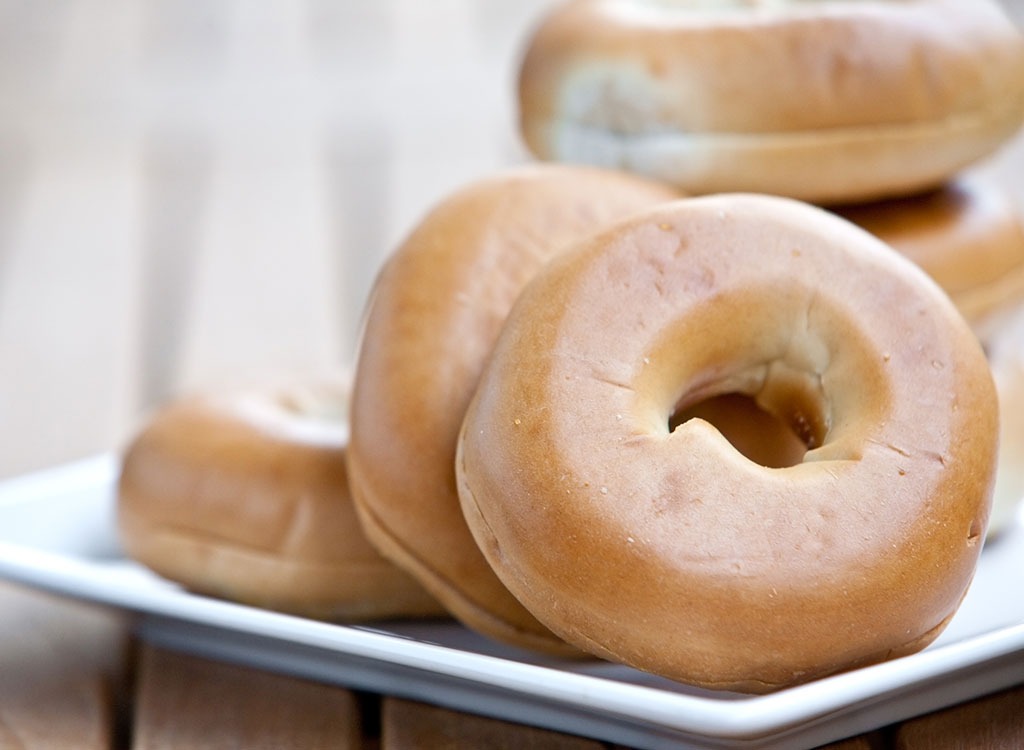
Unless your go-to bagel is made with whole grains, consider it a “Not That.” Though you may not think of the popular breakfast carb as a sweet indulgence, the body converts refined carbohydrates into sugar and then glucose, a nutrient that damages collagen and other wrinkle-fighting proteins. What’s more, when it comes to bread, bagels and even pasta, picking whole grains over refined will help keep your blood sugar levels even-keeled, aiding weight maintenance and weight loss, giving you a more youthful figure.
You Eat when You’re Stressed
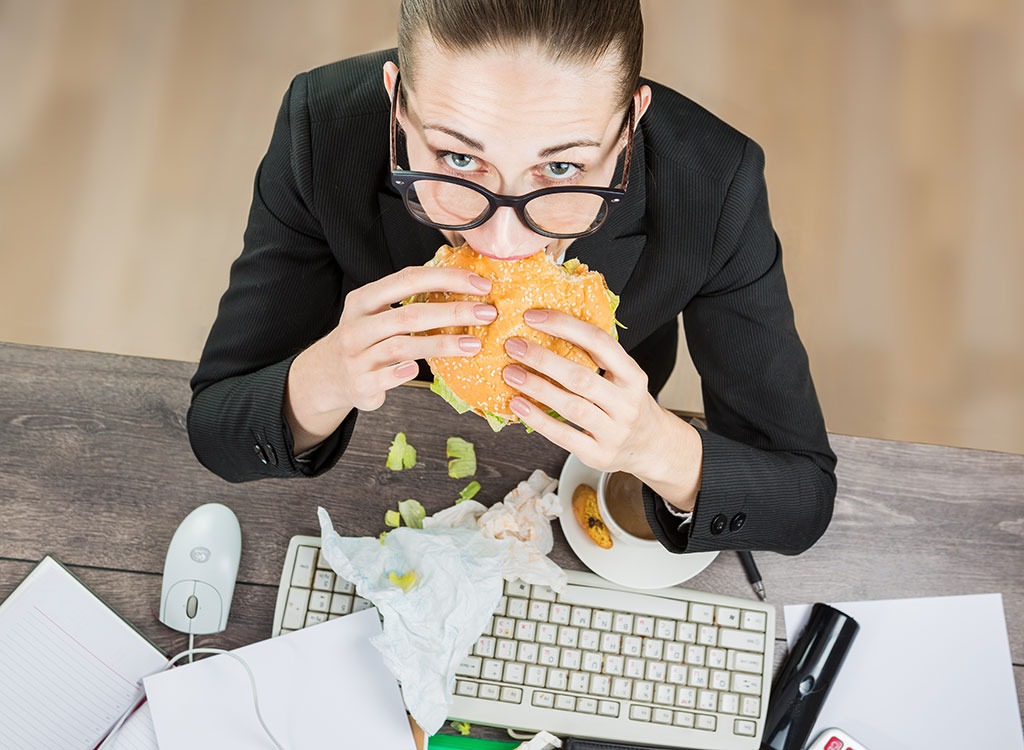
When stressful situations strike, popping open a can of soda can make it seem like everything’s going to be all right. But we know better, and now you will too: People who drink just two cans of soda daily are three times more likely to be depressed and anxious, compared to those who drink fewer, a study from the American Journal of Public Health found. Plus, cola is filled with artificial dyes that are possible human carcinogens and sweeteners that can lead to weight gain and obesity-related diseases. Next time you’re pulling your hair out, mix a cup of lowfat, plain yogurt with a tablespoon of raw nuts. The duo serves up a hefty dose of lysine and arginine, amino acids that decreases feelings of anxiety and stress.
You Eat when You’re Depressed
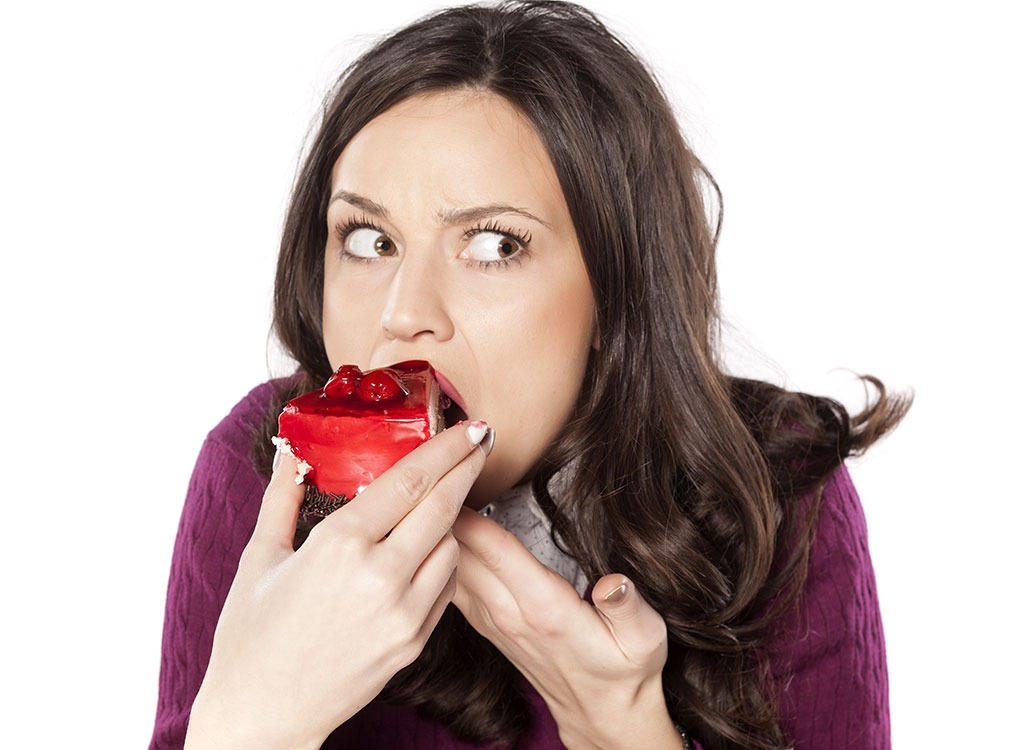
Although you may hear your sweet tooth calling when you’re feeling down in the dumps, it will serve you best to ignore it—especially if you’re craving white chocolate. White chocolate isn’t technically chocolate, since it contains no cocoa solids. That means it also lacks the ability to stimulate the euphoria-inducing chemicals that real chocolate does, especially serotonin. If you’re going to grab some chocolate, the darker the better. More cacao equals more happy chemicals and less sugar—which would only pull you down and make you frown. Pick one of these Best Chocolates for Weight Loss!
You Keep Your Kitchen Open All Night
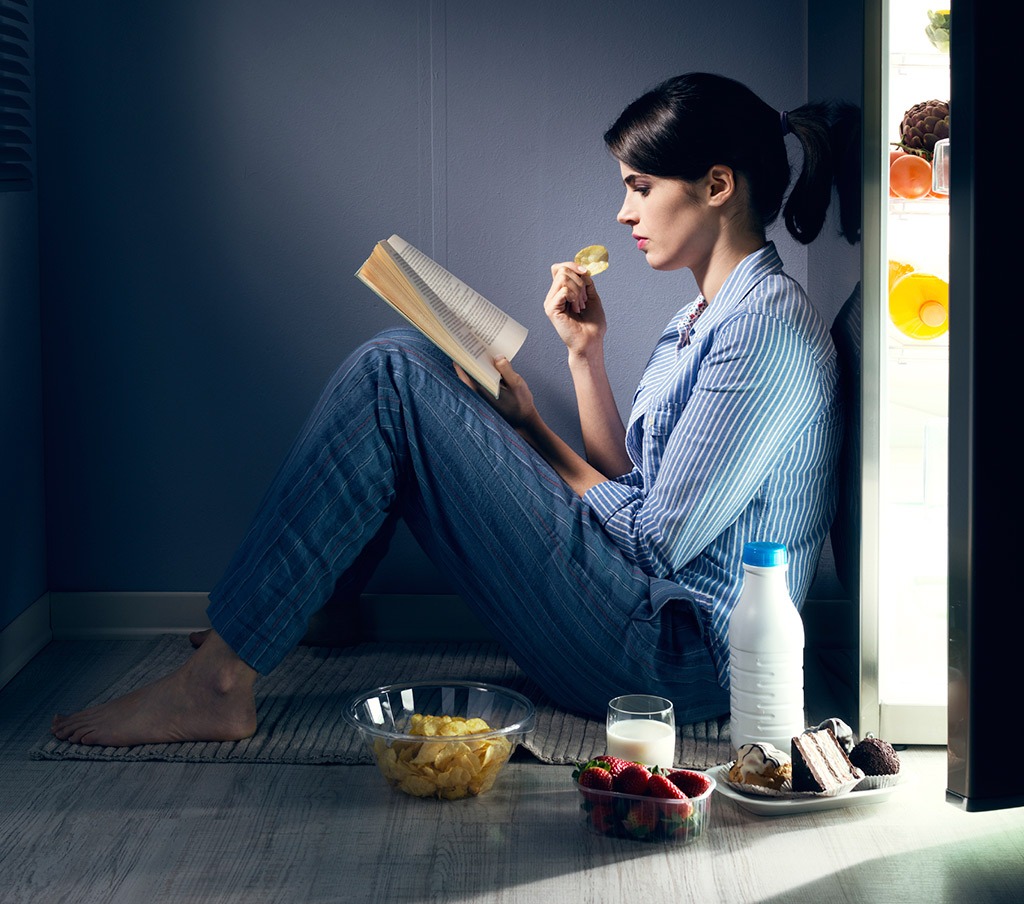
Nighttime fasting—aka closing the kitchen early—may help you lose more weight, even if you eat more food throughout the day, according to a study in the journal Cell Metabolism. Researchers put groups of mice on a high-fat, high-calorie diet for 100 days. Half of them were allowed to nibble throughout the night and day on a healthy, controlled diet, while the others only had access to food for eight hours, but could eat whatever they wanted. The result of the 16-hour food ban? The fasting mice stayed lean, while the mice who noshed ’round the clock became obese—even though both groups consumed the same amount of calories! Push back breakfast until 10 am to slim down and reset your body with our Ultimate One-Day Detox.
You Don’t Take Nutrition Advice

Good news! By reading this, you’re already forming habits that can help you shed pounds. When Canadian researchers sent diet and exercise advice to more than 1,000 people, they found that the recipients began eating smarter and working more physical activity into their daily routines. Not surprisingly, the habits of the non-recipients didn’t budge.
You Eat Free Restaurant Food
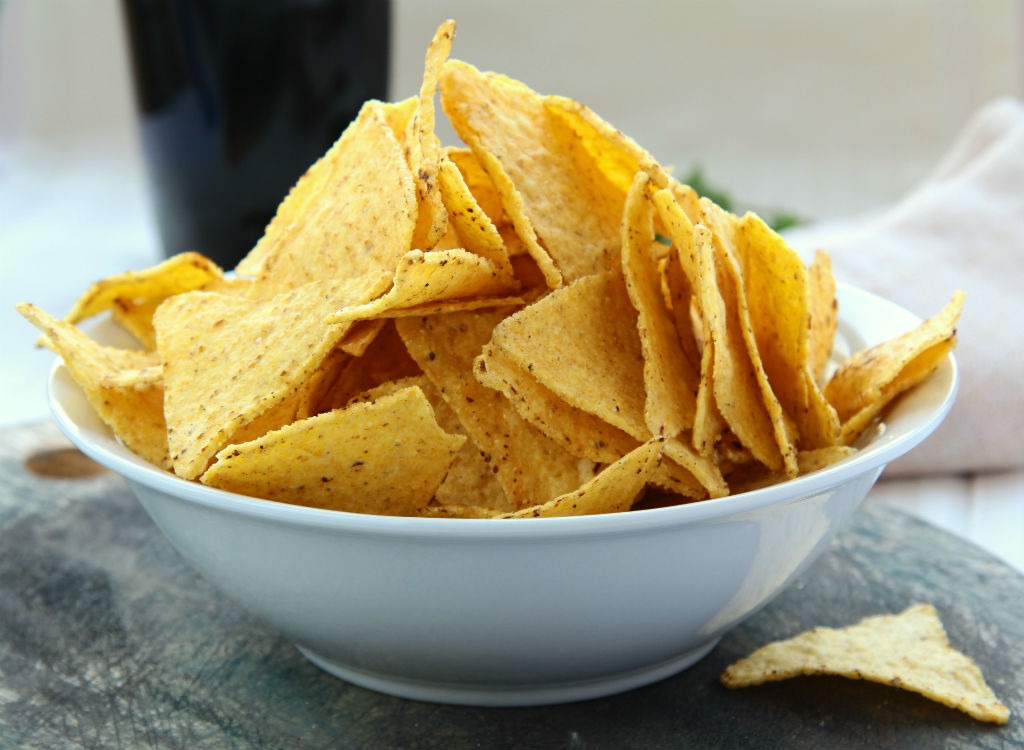
Breadsticks, biscuits, and chips and salsa may be complimentary at some restaurants, but that doesn’t mean you won’t pay for them. Every time you eat one of Olive Garden’s free breadsticks or Red Lobster’s Cheddar Bay Biscuits, you’re adding an additional 150 calories to your meal. Eat three over the course of dinner, and that’s 450 calories. That’s also roughly the number of calories you can expect for every basket of tortilla chips you get at your local Mexican restaurant. What’s worse, none of these calories comes paired with any redeeming nutritional value. Consider them junk food on steroids.
You Watch Way Too Much TV

A University of Vermont study found that overweight participants who reduced their TV time by just 50 percent burned an additional 119 calories a day on average. That’s an automatic 12-pound annual loss! Maximize those results by multitasking while you watch—even light household tasks will further bump up your caloric burn. Plus, if your hands are occupied with dishes or laundry, you’ll be less likely to mindlessly snack—the other main occupational hazard associated with tube time.
You Order the Combo Meal
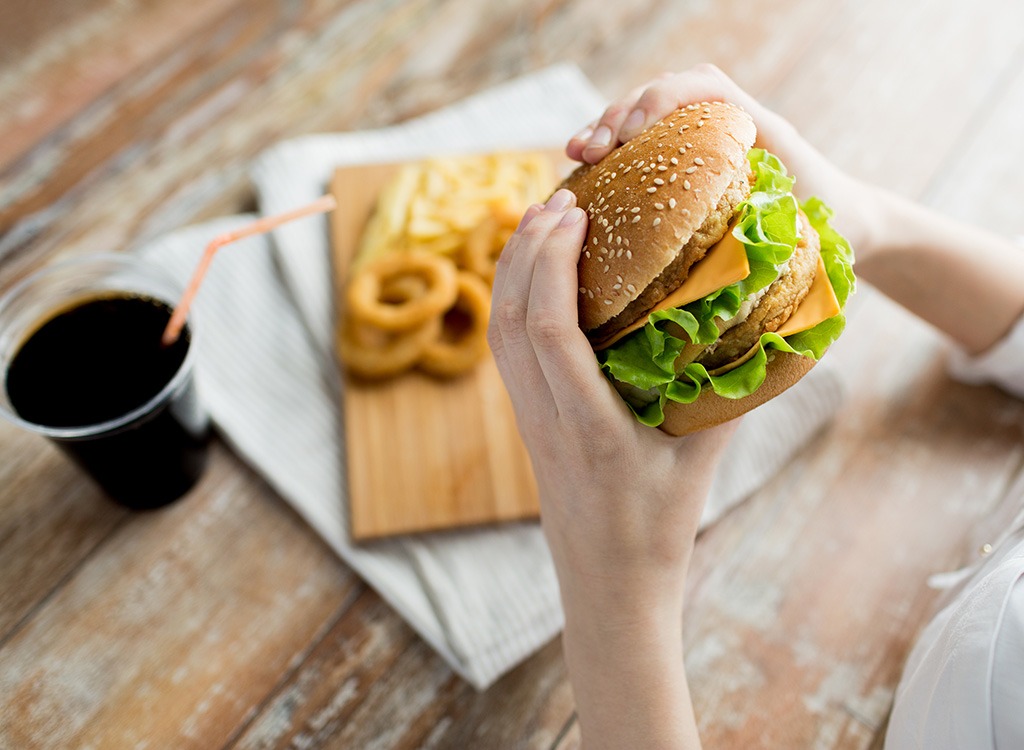
A study in the Journal of Public Policy & Marketing shows that compared to ordering a la carte, you pick up a hundred or more extra calories by opting for the “combo” or “value meal.” Why? Because when you order items bundled together, you’re likely to buy more food than you want. You’re better off ordering your food piecemeal. That way you won’t be influenced by pricing schemes designed to hustle a few more cents out of your pocket.
You Stay Too Late at Work

When you work later, you also eat later and go to sleep later, both of which lead to unwanted pounds. A study in the journal Nutrition Research found that those whose last meal was closest to bedtime took in more calories during the day. If you typically log late nights at the office, you could be diminishing the quality of your sleep and increasing your odds of weight gain. When you don’t feel rested, ghrelin–the hunger-stimulating hormone–goes into overdrive, increasing feelings of hunger even when the body isn’t in need of food. That’s only one of the only one of the 40 Bad Habits That Are Giving You Belly Fat!
You Sit Too Much

We sit an average of 67 hours a week — that’s nine hours a day sitting, six hours lying down, and only about seven hours out of every 24 spent actually moving. And our sedentary jobs now cause us to burn 100 fewer calories a day than we did 50 years ago. That alone translates to gaining an extra 10 pounds a year. A recent study in the Clinical Journal of the American Society of Nephrology found that a two-minute walk every hour can offset the effects of too much sitting.
You Order in Lunch at Work

A study found that just having a lot of take-out options near your work or along your commute to work makes you twice as likely to be obese. Think about that for a moment: Just the mere presence of take-out food increases your risk of obesity. The best thing for you to do is pack your lunches and at least two snacks to make sure you don’t have to go searching for food elsewhere.
You Drink Too Much Coffee
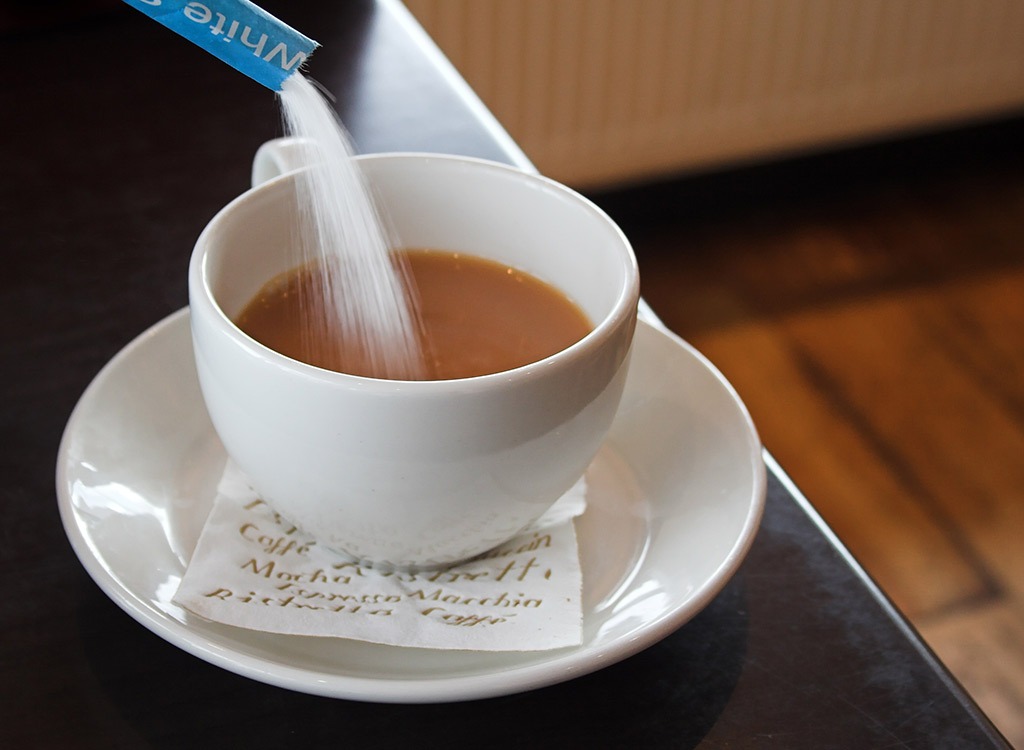
We wouldn’t dare ask you to forgo your morning cup of coffee…or even your 10 a.m. cup. But you might want to skip that 3:00 coffee run. Too much caffeine can lead to insulin resistance and increased fat storage, according to a study in the Journal of Agricultural and Food Chemistry. When the 3:00 slump hits, go for a walk or work out instead.
You Give in to Work Stress

When you’re stressed at work, you are more likely to gain weight because you’re more likely to want to hide under the covers when you get home. A recent study in the American Journal of Epidemiology found that people with high levels of job stress are 26 percent more likely to be inactive during their downtime than those with low-stress jobs. A University of Rochester study echoed these results, finding that stress at work leads to behaviors like watching TV and less exercise. It’s one thing for your job to make you unhappy. But if it’s making you unhealthy, it might be time to start looking around.
You Eat Processed Meats
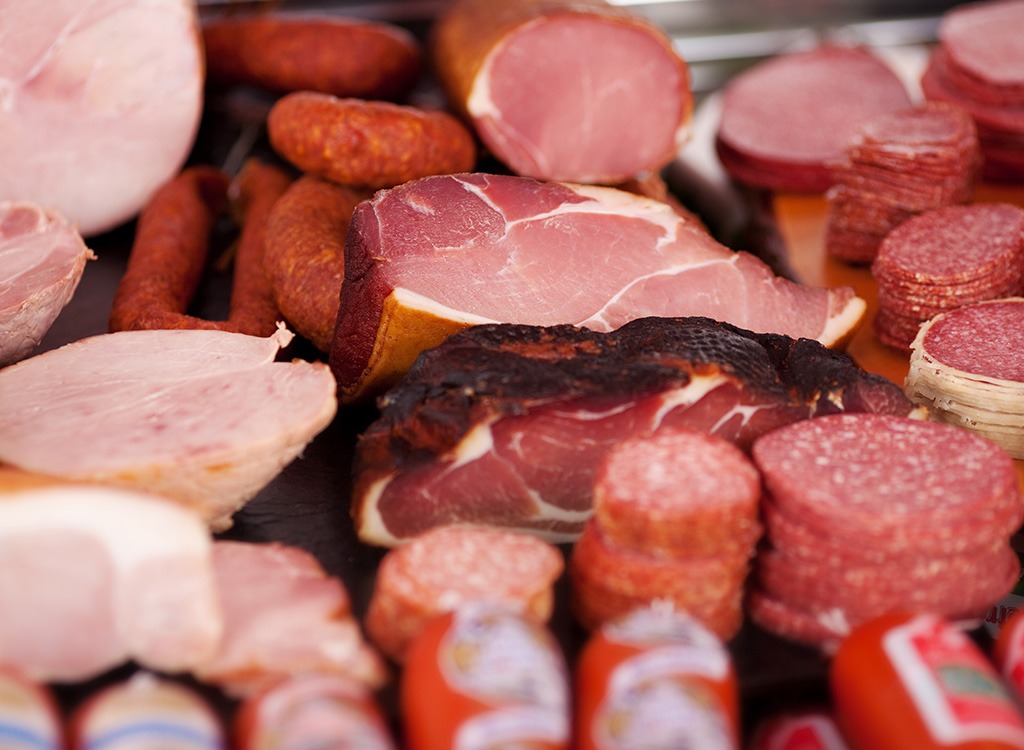
Many brands of bacon, sausage, hot dogs and deli meats contain nitrates, a preservative that interferes with the body’s natural ability to process sugar, which increases the risk for diabetes. It can also increase up your odds of thyroid and colon cancer. If that weren’t bad enough, most processed meats are also loaded with sodium, a known contributor to hypertension that can make you bloat and set you up to develop heart disease. Read the ingredients and look for meats that are free of nitrates. At the deli counter, ask for Boar’s Head All Natural Roasted Turkey Breast. It’s free of nitrates and relatively low in sodium. Applegate Natural’s Natural Slow-Cooked Ham and Organic Bacon are also good picks that can be found in the meats and cheese section of your grocery store.
You Sleep with the Light on

Exposure to light at night doesn’t just interrupt your chances of a great night’s sleep, it may also result in weight gain according to a new study published in the American Journal of Epidemiology. Study subjects who slept in the darkest rooms were 21 percent less likely to be obese than those sleeping in the lightest rooms.
You Bring Your Phone and IPad into the Bedroom

Research in Zero Belly Diet suggests that the more electronics we bring into the bedroom, the fatter we get—especially among children. A study in the Pediatric Obesity journal found that kids who bask in the nighttime glow of a TV or computer don’t get enough rest and suffer from poor lifestyle habits. Researchers found that students with access to one electronic device were 1.47 times as likely to be overweight as kids with no devices in the bedroom. That increased to 2.57 times for kids with three devices. Leave your iPad in the living room.

